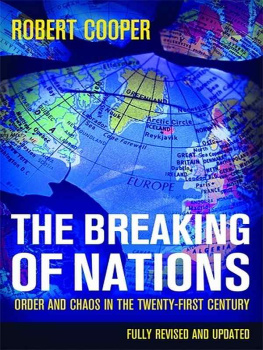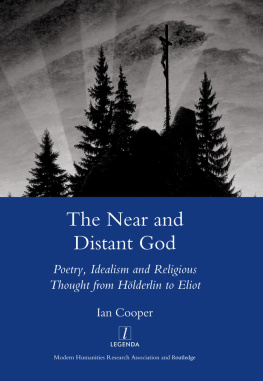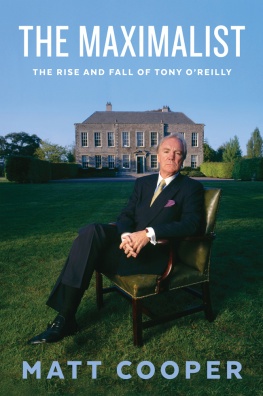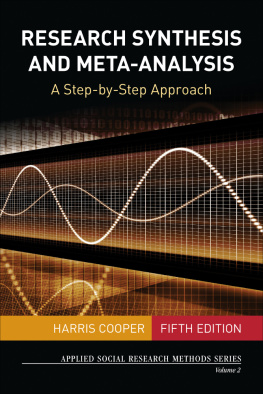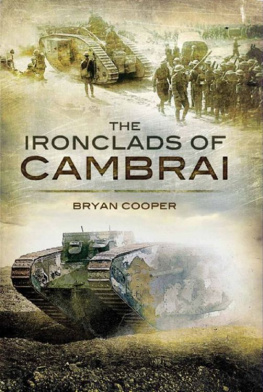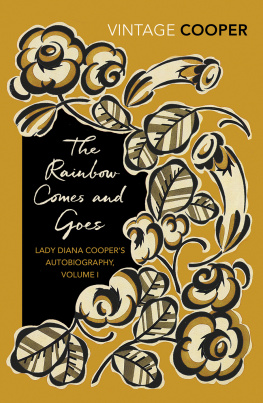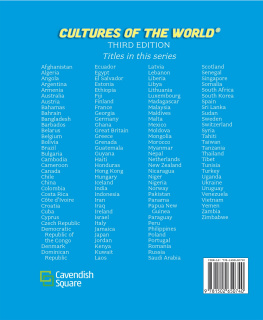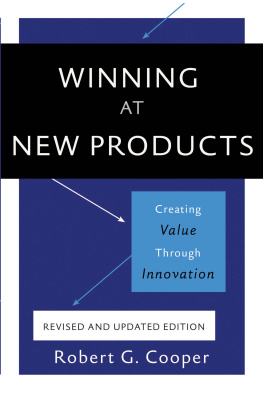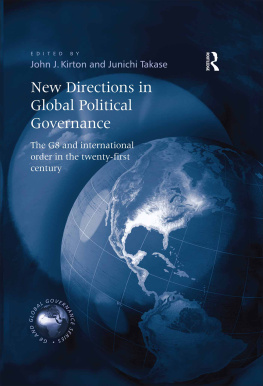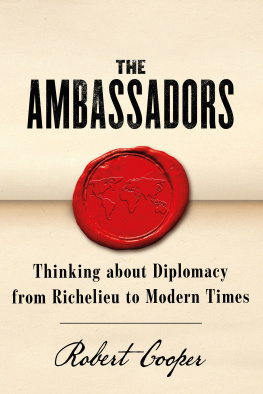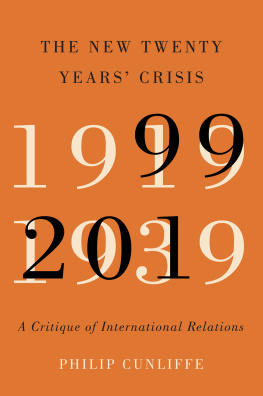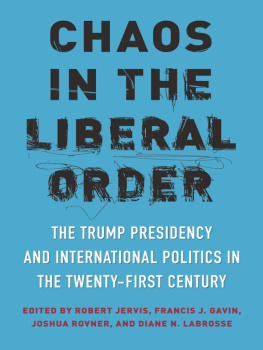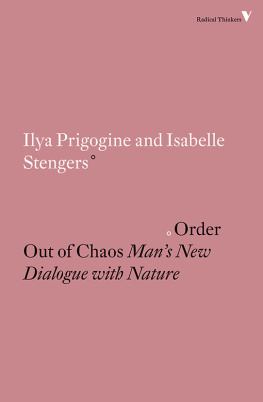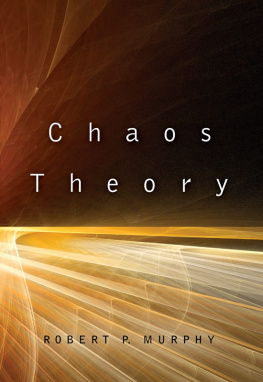THE BREAKING OF NATIONS
ROBERT COOPER is one of Europes most senior diplomats. A former special adviser on foreign affairs to Tony Blair, he is currently Director-General of External and Politico-Military Affairs for the Council of the European Union.
Acclaim for The Breaking of Nations:
Robert Cooper is Europes pre-eminent scholar-diplomat. His bold vision for the future of Europe, and of the United States, is full of wisdom and admirable idealism. This brilliantly written book carries the transatlantic conversation to the next stage. Robert Kagan, author of Paradise and Power
Robert Cooper is one of the worlds most thoughtful diplomats, and he brings his world of experience to bear on the dilemmas we face after September 11 in a way that any reader will find both readable and illuminating at the same time. Professor Joseph Nye, author of The Paradox of American Power, dean of the Kennedy School of Government and former chair of the American National Intelligence Council
A tract for our times from one of the most acute European observers of international politics, drawing on his direct experience as a diplomat and foreign policy adviser. His conclusions on Europes international responsibilities raise issues which all European governments need to address. Professor William Wallace, London School of Economics
A seminal work: not only is it a brilliant and successful attempt to bring intellectual order to the chaos of the twenty-first century, it is also a powerful reminder that Europes future is what its leaders make it: nothing is pre-ordained. Franois Heisbourg, International Institute for Strategic Studies
Robert Cooper is widely believed to provide the intellectual super-structure for what the prime minister thinks, but is as yet reluctant to articulate publicly... The Breaking of Nations is a fluent, stimulating and often original book. Brendan Simms, Sunday Times
Intelligent and stylish. Robert Skidelsky, New Statesman
Last years transatlantic tiff over Iraq appeared to vindicate Robert Kagans famous quip that Americans are from Mars and Europeans are from Venus. Is there any way to bring these planets into alignment? If anyone can pull it off, it is Robert Cooper, a senior British diplomat who has gone from being one of Tony Blairs closest foreign policy advisers to serving under Javier Solana, the European Unions putative foreign minister... The Breaking of Nations is essentially an attempt to bridge the ideological divide between hard and soft power. Both, he suggests in this short, elegant collection of essays, are necessary in todays messy world. Max Boot, New York Times
The Breaking of Nations offers a sweeping interpretation of todays global predicament... Cooper makes a provocative call for a new Western imperialism that is compatible with human rights and cosmopolitan values... Worthy of serious debate. G. John Ikenberry, Foreign Affairs
A riveting read... The Breaking of Nations is packed with insight and ought to be required reading for every diplomat. European Voice
THE BREAKING OF NATIONS
Order and Chaos in the Twenty-first Century
ROBERT COOPER

First published in hardback in Great Britain in 2003 by Atlantic Books, an imprint of Grove Atlantic Ltd
This revised and updated paperback edition published by Atlantic Books in 2004.
Copyright Robert Cooper 2003, 2004
The moral right of Robert Cooper to be identified as the author of this work has been asserted in accordance with the Copyright, Designs and Patents Act of 1988.
All rights reserved. No part of this publication may be reproduced, stored in a retrieval system, or transmitted in any form or by any means, electronic, mechanical, photocopying, recording, or otherwise, without the prior permission of both the copyright owner and the above publisher of this book.
Sections of this book were published in earlier forms as The Postmodern State and the World Order by Demos in 1996; and by Demos and The Foreign Policy Centre in 2000. The publishers gratefully acknowledge the assistance of Demos and The Foreign Policy Centre in the publication of this book.

1 3 5 7 9 10 8 6 4 2
A CIP catalogue record for this book is available from the British Library.
ISBN 1 84354 231 5
eBOOk ISBN 9 78085 789 5639
Typeset by FiSH Books, London
Printed in Great Britain by Bookmarque Limited, Croydon
Atlantic Books
An imprint of Grove Atlantic Ltd
Ormond House
2627 Boswell Street
London WC1N 3JZ
ACKNOWLEDGEMENTS
The original version of was published by Demos in 1996. A second updated version was published again by Demos in 1999. I am grateful to Demos (in particular to Geoff Mulgan and Tom Bentley) for stimulating me to write and for the helpful advice they gave along the way.
(which was originally intended to be a short note for the Prime Minister to read at Christmas) developed into a longer essay at the instigation of Mark Leonard and the Foreign Policy Centre. It had originally been my plan to publish it with them. I am grateful for all the help they gave me and also for their willingness to allow me to pursue the project in this altered form.
A shorter version of first appeared in Internationale Politik as a farewell present from me to Dr Angelika Volle. I am grateful to her and to Internationale Politik.
I have received helpful comments from too many people to recall on all parts of this work but I should particularly mention Heather Grabbe and Alexandras Yannis for whose comments on , and to the ideas that lie behind it.
Finally, I should thank both the British Government and the General Secretariat of the Council of the European Union, who have generously allowed me to publish over the years in spite of my official position. The ideas in these essays are my own (insofar as anybody can own an idea) and any resemblance to British or European policy is purely accidental.
PREFACE
The worst times in European history were in the fourteenth century, during and after the Hundred Years War, in the seventeenth century at the time of the Thirty Years War, and in the first half of the twentieth century. The twenty-first century may be worse than any of these.
The first two periods were times when order broke down, when church, state and other ties of obligation were losing their power to discipline mens aggression. In the fourteenth century, the old order of chivalry was fading; feudal ties, weakened in endless wars, were giving way to patriotism; and the Church was divided by Frances creation of the Avignon Papacy. After the Hundred Years War, bands of soldiers roamed the ruined landscape of France terrorizing the countryside.
In the seventeenth century, the Church was split by the new Protestant movements and the wars that followed were both wars between states and wars of religion. Bringing together the power of the state and the fanaticism of the faithful, these wars without limit and without mercy laid waste to central Europe. Social order all but collapsed. By some accounts, a third of the population of Germany died. Every ten years in a passion play, the citizens of the Bavarian town of Oberammergau still give thanks for their deliverance from the Swedes. For most countries outside Europe, too, the worst memories of history are of periods of disorder: the era of the warring states in China, for example. Golden ages are usually times of strong government.
Next page
